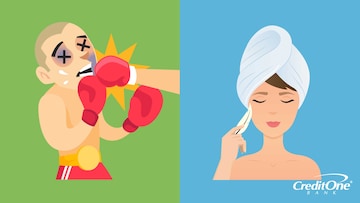August 03, 2022
What does that pre-approved credit card offer mean to your credit score? Here’s your answer, as well as additional benefits you might not be aware of.

Do Pre-Approved Credit Card Offers Affect Your Credit?
If you’ve received a pre-approved credit card offer, you’ll be happy to know that no, it doesn’t affect your credit score.
Pre-approved offers are based on the creditor having done a “soft inquiry” to your credit report, which is basically just an innocent peek behind the curtains. Soft pulls do not impact your credit score.
Both soft inquiries and hard inquiries are checks on your credit background. Both show up on your credit report. But only you can see the soft inquiries, whereas businesses checking your reports see just the hard inquiries.
How Do Pre-Approved Credit Card Offers Work?
Pre-approved credit card offers are extended after a creditor checks to see if you might be a good match for their product offering.
If you accept the pre-approved offer and decide to apply, they will then do a “hard inquiry,” also called a hard pull. This process is to make sure you still qualify for the card and to determine what your terms like credit line should be.
A hard inquiry gives the creditor more information than a soft inquiry.
Also, when they pull the trigger on that hard inquiry, your credit score will likely take a small hit. Hard inquiries are a recorded timeline of when you’ve applied for credit, and become part of your report for all creditors and lenders to see.
So while a pre-approved card offer does not affect your credit score, applying for the offer does. A hard inquiry can impact your score by approximately 5 to 10 points. However, this is a temporary ding, and your score typically bounces back after a few months.
Benefits of Pre-Approved Credit Cards
Besides making you feel good about being chosen, pre-approved credit cards come with numerous benefits.
- No credit score impact: We’ve already talked about this, but it’s worth mentioning again. Pre-approval has no effect on your credit score (unless you decide to go ahead and apply for the card).
- Streamlined process: Instead of having to take the time and effort to research and track down cards you think might be suitable for your needs, the offers are coming directly to you.
- Competitive terms: Because the card company is approaching you with an invitation, there’s a chance you might get special rates not available to the general public.
- Promotional rates: Some pre-approved credit cards come with promotions, like an introductory 0% APR for a limited time or reduced rates for balance transfers. If you already have higher-rate credit cards, you can take advantage of these opportunities to pay them off.
- Bonuses and other perks: You could receive bonus rewards, gifts, or other attractive incentives just for accepting the invitation and getting approved. This could be higher points or cash back rewards for a limited time, bonus statement credits for meeting purchase goals, or free gifts on approval.
How to Improve Chances of Being Pre-Approved
Pre-approval is not a guarantee of receiving a credit card. But being pre-approved can improve your chances of getting a credit card. And, in turn, there are several ways to improve your chances of getting pre-approved for an offer.
- Pay all of your bills on time
Your payment history is the most important factor affecting your credit score. It’s worth 35% of the entire score, meaning regular on-time payment is the best thing you can do for your credit profile, and late or missed payments are the worst things you can do.
If you could use some help hitting those due dates, consider using AutoPay to make your minimum payments—or better yet, pay off your balance in full every month. - Don’t use all your credit
If you want pre-approval offers for new credit, you can’t use up your existing credit. This tip is worth 30% of your credit score, and it’s the second most important thing behind payment history.
Your credit utilization ratio (CUR) is the percentage of your revolving credit that you’re using at any given time. Financial experts recommend keeping this number below 9%, so on a $1,000 credit line, you would keep your balance below $90. If that’s impossible, the general advice is to keep it under 30% ($300 on a $1,000 credit limit). - Don’t open too many new accounts
Even though it’s good to have more credit than you actually need to use, don’t open a bunch of new accounts all at once. Every time you apply for a new account, a hard inquiry shows up on your credit report and stays there for two years, directly affecting your credit score for six months. Too many of these send out a signal to creditors that you might be in danger of racking up more debt than you can handle. - Keep old accounts open
While you shouldn’t open too many new accounts all at once, you also shouldn’t close your older accounts. The average age of your open lines of credit is worth 15% of your credit score.
Keeping them active also affects your credit utilization ratio, because it’s credit you’re not using. So adding the aforementioned 15% to the 30% for your CUR, it’s worth 45% of your score just to keep old lines of credit open.
Now that you know how to optimize your chances of receiving a pre-approval offer, you don’t have to wait. Check if you already have a pre-approved credit card offer at GetCreditOne.com.
Jim Holborow is a researcher, writer, and editor specializing in credit building and personal finance. As a contributor to the Credit One Bank knowledge base, Jim creates informative, engaging content good for boosting your credit IQ or just getting guidance on the go. He holds a BS in Marketing from the University of Nevada-Reno, with continuing studies in marketing analytics.




